|
And the sightseeing opportunities just can't be topped. Fortunately, Jasper National Park is the kind of place that will never change. One hundred years from now, the place will
be as pristine and as wild as it is today. Although Jasper and its surrounding natural wonders are an extremely popular destination for visitors from around the world,
commercialism is minimal and does not deviate the national park from its mission of "remaining wonderful, by nature".
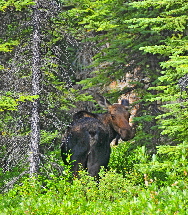
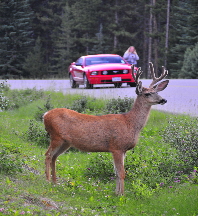 The one thing we quickly learned was to always have our cameras ready as all areas of the park are rich in wildlife and scenery. Wildlife
is abundant and often visible right from the roads and the ever-changing vistas are all gorgeous. The beautiful lakes and rivers have a variety of fish which include northern pike, rainbow
trout, lake trout, brook trout, and bull trout. On land, black bear, moose, elk, deer, sheep and other big game roam the forest-laden mountains. The one thing we quickly learned was to always have our cameras ready as all areas of the park are rich in wildlife and scenery. Wildlife
is abundant and often visible right from the roads and the ever-changing vistas are all gorgeous. The beautiful lakes and rivers have a variety of fish which include northern pike, rainbow
trout, lake trout, brook trout, and bull trout. On land, black bear, moose, elk, deer, sheep and other big game roam the forest-laden mountains.
Visitors arrive in Jasper by car or by train, (see related article on VIA Rail). If arriving on
VIA Rail, it's advisable to rent a car in order to have the flexibility and the time to visit all the great natural wonders within the national park. For just a few short summer
months, all the natural attractions are open from daylight to sunset and we found they were all worth a visit.
There are many must-see natural attractions in the park and each one offers its own unique environment and experience. Following are the ones we were able to visit in a
few days in the area.
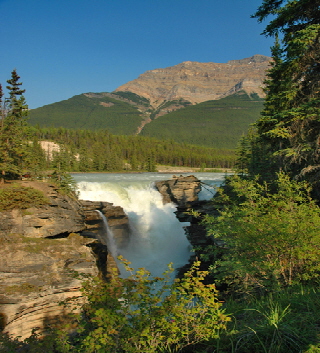 Athabasca Falls - We found this to be one of the most breathtaking falls in the Rocky Mountains and the easiest to view. A wide
walkway takes visitors to a narrow gorge where the walls have been carved out and smoothed by the sheer force of the rushing water for thousands of years. The
headwaters start at the Columbia Glacier about 43 miles south and the river parallels the Icefields Parkway. We recommend going early in the day or late, after the crowds have dwindled. Athabasca Falls - We found this to be one of the most breathtaking falls in the Rocky Mountains and the easiest to view. A wide
walkway takes visitors to a narrow gorge where the walls have been carved out and smoothed by the sheer force of the rushing water for thousands of years. The
headwaters start at the Columbia Glacier about 43 miles south and the river parallels the Icefields Parkway. We recommend going early in the day or late, after the crowds have dwindled.
Columbia Icefields - (open May 1 - October 15) The Icefield Parkway which connects Jasper to the Columbia Icefields is one of the world's 10 greatest scenic drives
. To take advantage of the views and the many scenic stops along the way, plan on at least half a day to have enough time to
take in the entire experience. On our way, we saw four bighorn sheep grazing quietly on the riverbed, a unique sight according to the locals.
The Icefields are at the southern border of Jasper National Park and the northern border of Banff National Park. Over 230 square miles of ice make this the largest icefield south
of Alaska. Organized group tours are optional and take visitors to the nearest glacier, the Athabasca. To get a true sense of the scope of the Columbia Glacier, walk through
the Interpretive Center. A 3-D topographical model of the Rocky Mountains, the Columbia Icefields and the various glaciers around it demonstrates the massive water
source of the North American continent.
Maligne Canyon - It doesn't look like much from the road, so we were particularly impressed to find it was a spectacular gorge, very accessible from Jasper. Sheer
limestone walls plunge to depths of over 165 feet after 10,000 years of erosion have created a narrow, super deep gorge. The interpretive trail bridges the canyon six times,
but the most spectacular sections can be seen
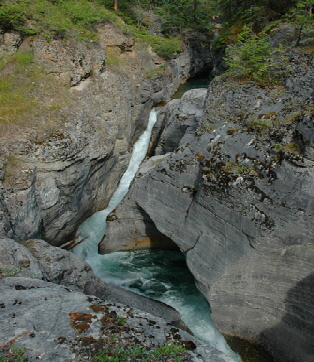 from the first two bridges at the upper end. At the top of the Maligne Canyon, opposite the teahouse, you'll see large
potholes in the riverbed. These potholes are created when rocks and pebbles become trapped in what begins as a shallow depression; under the force of the rushing
water, they carve jug-shaped hollows into the soft bedrock. To really enjoy this canyon, take the time to walk the trail from beginning to end. from the first two bridges at the upper end. At the top of the Maligne Canyon, opposite the teahouse, you'll see large
potholes in the riverbed. These potholes are created when rocks and pebbles become trapped in what begins as a shallow depression; under the force of the rushing
water, they carve jug-shaped hollows into the soft bedrock. To really enjoy this canyon, take the time to walk the trail from beginning to end.
Maligne Lake - About 30 minutes from Jasper, Maligne Lake is the center of most water-related activities. On the drive to the lake, we saw a black bear with cubs and
deer. Fishing, canoeing, kayaking, and scenic boat tours are available here. Excellent hiking trails are located on either side of the lake, practically guaranteeing you
will see some wildlife along the way. Operated seasonally, the water-related activities begin in late April and continue until the snow flies.
This is the second largest glacier-fed lake in the world and the breathtaking scenery includes a number of glaciers and waterfalls along with the crystal-clear turquoise
waters found only in the mountains. Spirit Island which lies about 8 miles away from the lake entry area are in fact, the most photographed place in Canada, according to many
sources. We would additionally say that the Spirit Island area is perhaps the most photogenic spot in the entire North American Rocky Mountains. It is absolutely gorgeous!
All commercial operations to and around the lake are operated by Maligne Tours (www.malignelake.com). During our fishing trip there, we saw a moose on the shore just 20
yards away from us. In addition to the cruises and boat rentals, Maligne Tours operates a souvenir shop and large café with a huge area of tiered outdoor seating overlooking
the lake. For those without a car, the Maligne Lake Shuttle runs from the Maligne Tours office and from various hotels in Jasper out to the lake eight times daily through summer.
|
Contact Info
Travel Alberta International
Tel: (403) 509-2597|
www.travelalberta.com
Jasper Tourism & Commerce
Phone - 780-852-3858
www.jaspercanadianrockies.com
Maligne Tours Ltd
(780) 852 - 3370
Email: maligne@malignelake.com
|
|
Medicine Lake - Located on the way to Maligne Lake, this lake offers a bit of mystery and intrigue. Due to its unusual underground drainage system, the lake
sometimes disappears and becomes a flat valley with a thin creek running through it. Indians thought that "spirits" were responsible for the dramatic fluctuations.
Miette Hot Springs - At the turn of the century, hardy visitors managed the 17 miles uphill required to reach this steaming natural hot spring. Today you approach the
springs on a scenic winding road with spectacular views. The hot springs are now fully modern, offering two hot pools and a variety of amenities, including lockers and swimsuit rentals.
Mt. Edith Cavell - It is best to visit this location when the weather is good since the last bit of the road is unpaved. But the ride is well worth it. A trail leads to a
small lake with Angel Glacier in the background. Efforts are under way to restore this scenic view and to keep visitors on the main walking trails. This popular scenic view is
the highest point in this range and the most famous. This 11,033-foot peak is the most distinctive and impressive in the park. Known to Indians as the "White Ghost" for its
snowcapped summit, the mountain was given its official name in honor of a British army nurse who was assassinated by the German army in 1915 for helping allied prisoners of
war escape German-occupied Belgium during World War I.
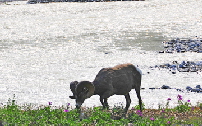
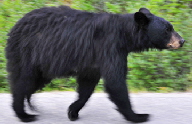 Sunwapta Falls - Another spot not to miss, the Sunwapta Falls name comes from a Stoney Indian word for "turbulent river." The river changes course
abruptly from northwest to southwest and then plunges into a scenic deep canyon. Not quite as impressive as Athabasca Falls, this stop
nevertheless showcases the swift water and canyon environment that is so much a part of the national park. Sunwapta Falls - Another spot not to miss, the Sunwapta Falls name comes from a Stoney Indian word for "turbulent river." The river changes course
abruptly from northwest to southwest and then plunges into a scenic deep canyon. Not quite as impressive as Athabasca Falls, this stop
nevertheless showcases the swift water and canyon environment that is so much a part of the national park.
James Michener once said: "To be wholly alive, a man must know storms; he must feel
the ocean as his home or the air as his habitation. He must smell the things of earth, hear the sounds of living things and taste the rich abundance of the soil and the sea."
Jasper National Park is one of those places that allow the average person to live these words.
|